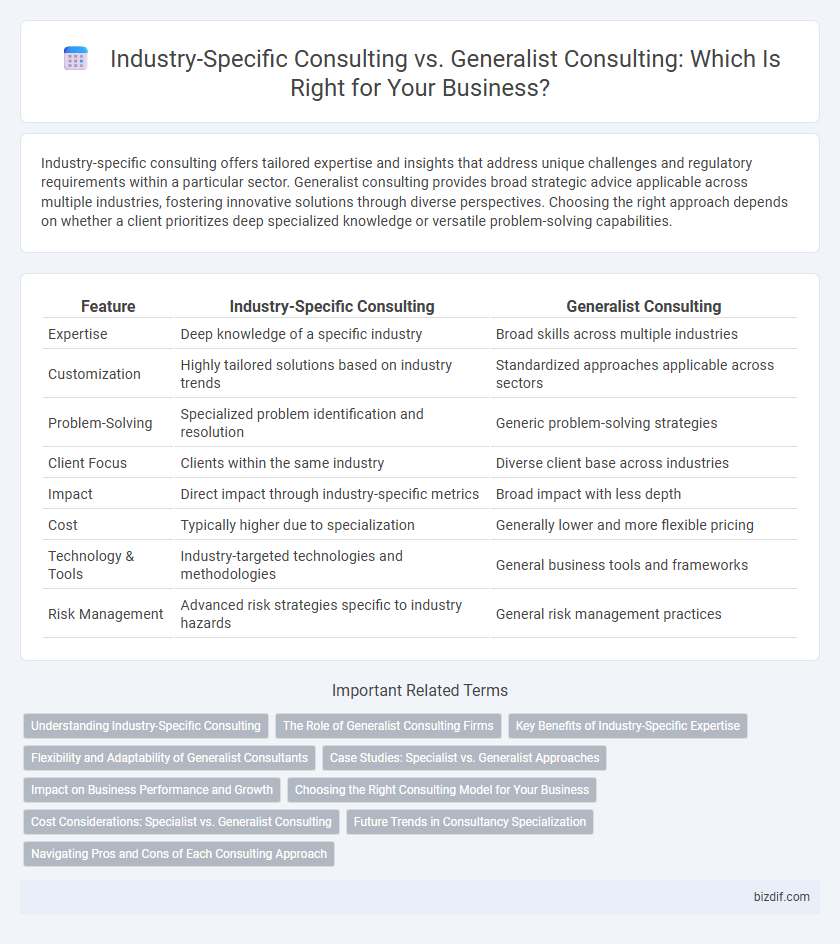Industry-specific consulting offers tailored expertise and insights that address unique challenges and regulatory requirements within a particular sector. Generalist consulting provides broad strategic advice applicable across multiple industries, fostering innovative solutions through diverse perspectives. Choosing the right approach depends on whether a client prioritizes deep specialized knowledge or versatile problem-solving capabilities.
Table of Comparison
| Feature | Industry-Specific Consulting | Generalist Consulting |
|---|---|---|
| Expertise | Deep knowledge of a specific industry | Broad skills across multiple industries |
| Customization | Highly tailored solutions based on industry trends | Standardized approaches applicable across sectors |
| Problem-Solving | Specialized problem identification and resolution | Generic problem-solving strategies |
| Client Focus | Clients within the same industry | Diverse client base across industries |
| Impact | Direct impact through industry-specific metrics | Broad impact with less depth |
| Cost | Typically higher due to specialization | Generally lower and more flexible pricing |
| Technology & Tools | Industry-targeted technologies and methodologies | General business tools and frameworks |
| Risk Management | Advanced risk strategies specific to industry hazards | General risk management practices |
Understanding Industry-Specific Consulting
Industry-specific consulting delivers tailored expertise by leveraging deep knowledge of a particular sector's challenges, regulations, and market trends to drive strategic growth and operational efficiency. Consultants specialize in areas such as healthcare, manufacturing, or finance, enabling them to provide actionable insights and customized solutions that generalist consultants may overlook. This specialized focus enhances decision-making accuracy and accelerates problem-solving within complex industry environments.
The Role of Generalist Consulting Firms
Generalist consulting firms provide versatile expertise across multiple industries, enabling them to address diverse business challenges with broad strategic insights. They leverage cross-industry knowledge to offer innovative solutions that might not be apparent within a single sector, driving agility and creative problem-solving. Their ability to synthesize trends and best practices from various fields supports clients in adapting to dynamic market conditions and achieving sustainable growth.
Key Benefits of Industry-Specific Expertise
Industry-specific consulting delivers tailored solutions grounded in deep knowledge of sector regulations, market trends, and competitive dynamics, enabling faster and more effective problem-solving. Consultants with industry expertise provide actionable insights that drive innovation and operational efficiency by leveraging best practices unique to the field. This specialized approach reduces risk and enhances strategic decision-making, resulting in higher ROI for clients compared to generalist consulting services.
Flexibility and Adaptability of Generalist Consultants
Generalist consultants excel in flexibility and adaptability by leveraging diverse industry knowledge to address complex business challenges across various sectors. Their broad skill set enables them to quickly understand new environments and tailor solutions to unique client needs, surpassing the often rigid frameworks of industry-specific consulting. This versatility allows organizations to benefit from innovative strategies that integrate best practices from multiple industries.
Case Studies: Specialist vs. Generalist Approaches
Case studies reveal that industry-specific consulting often delivers deeper insights and tailored solutions by leveraging specialized knowledge and experiences within a particular sector, such as healthcare or finance. Generalist consulting approaches provide broader perspectives, valuable for cross-industry innovation but may lack the nuanced understanding critical for complex, sector-specific challenges. Businesses navigating highly regulated or technologically advanced fields typically benefit more from specialist consultants who offer targeted strategies aligned with industry standards and emerging trends.
Impact on Business Performance and Growth
Industry-specific consulting delivers tailored strategies leveraging deep sector expertise, directly enhancing operational efficiency, market positioning, and innovation capacity. Generalist consulting offers broad, adaptable frameworks suited for diverse challenges but may lack the nuanced insights required to address unique industry complexities. Businesses engaging industry-specific consultants often achieve faster performance improvements and sustained growth due to specialized knowledge and targeted solutions.
Choosing the Right Consulting Model for Your Business
Industry-specific consulting provides tailored expertise and deep market insights that address niche challenges, driving more precise and effective solutions for businesses within a particular sector. Generalist consulting offers broader perspectives, enabling flexibility and cross-industry innovation, which benefits companies seeking diverse strategic advice. Choosing the right consulting model depends on business goals, complexity of challenges, and the need for specialized knowledge versus adaptable strategies.
Cost Considerations: Specialist vs. Generalist Consulting
Industry-specific consulting often entails higher upfront costs due to the consultant's deep expertise and tailored solutions, offering greater value through targeted insights and efficient problem-solving. Generalist consulting tends to be more cost-effective initially, providing broad, adaptable guidance suitable for diverse challenges but may lack the nuanced understanding crucial for complex industry issues. Businesses must weigh the long-term return on investment, considering whether specialized knowledge justifies the higher fees compared to the broader, more flexible support of generalist consultants.
Future Trends in Consultancy Specialization
Industry-specific consulting is increasingly prioritized as businesses seek tailored expertise to navigate complex market dynamics and regulatory environments, leveraging deep sector knowledge to drive innovation and operational efficiency. Generalist consulting remains valuable for holistic problem-solving and cross-industry insights but faces competition from specialized firms equipped with advanced data analytics and AI tools tuned to particular industries. Future trends indicate a surge in hybrid models blending generalist flexibility with industry specialization, enhanced by digital transformation and predictive analytics to deliver precision strategies and sustainable growth.
Navigating Pros and Cons of Each Consulting Approach
Industry-specific consulting offers deep expertise, enabling tailored strategies and solutions that align closely with sector regulations, market trends, and competitive dynamics, which can accelerate decision-making and implementation. Generalist consulting delivers broad business perspectives across multiple industries, fostering innovative cross-sector insights and flexible problem-solving frameworks beneficial for organizations with diverse challenges. Evaluating the consultancy needs based on project complexity, industry nuances, and desired outcomes is crucial to determine the optimal approach that balances specialized knowledge with adaptable methodologies.
Industry-Specific Consulting vs Generalist Consulting Infographic

 bizdif.com
bizdif.com